Vampyr
Vampyr
Bloodless brawl with questionable gameplay
Finally, finally, finally they are back on the rise: Vampire games. I've been waiting like an run dry game sucker for years for a good game dedicated to the sinister nocturnal creatures. Sure, they are an integral part of the fantasy cosmos and have never been underrepresented, but good role-playing games à la Vampires: The Masquerade – Bloodlines are in short supply. Keyword Vampires: The latest installment is like a silver lining on the gaming horizon and seems to be able to meet the expectations that can be placed on the successor to the critics' darling. In fact, in preparation for the latest work, I wanted to catch up on the original from 2004, which was not accessible to me at the tender age of 12. I wanted to, mind you, because unfortunately, despite community patches and a lack of nostalgia goggles, I barely managed to play the game for more than eight hours. Too sluggish, too cumbersome, simply too old.
That's where Vampyr Vampyr comes in. A role-playing game from Don't Nod, the makers of Life is Strange, set in Victorian London at the beginning of the 20th century. With the outbreak of the Spanish flu, the city, shaken by the Great War, descends into chaos, with civil war-like conditions taking place on the streets. The premise: We are a doctor and have to weigh up whether to heal our patients or quench our thirst for blood. These decisions between life and death also determine the state of the city; every drained inhabitant can plunge the district further into chaos. That sounds like a guarantee for excellent entertainment, with in-depth decisions and a gripping story.
Sucker for choice
The game begins in a wonderfully atmospheric way. Our protagonist opens his eyes. He lies surrounded by corpses, some still fresh, others decomposed to the bone. A mass grave. Panicked, he climbs out of the pit and drags himself through the deserted alleyways. The colors are desaturated, only splashes of red shine towards us. A dark pulsing pervades the gray of our world. Suddenly we come across a black outline, criss-crossed with red veins and arteries. We see a pulsating heart. As we embrace the silhouette, we hear the distant voice of a woman who calls us “brother”. Sobbing, she tells us how relieved she is to have found us. The sounds are muffled, as if after an explosion, with only the booming pulsation ringing in our ears.
The inevitable happens: driven by instinct, our hero sinks his teeth into the woman's neck and sucks her dry. Mary, the hero's sister, lies dead in our arms. Back to his senses, our protagonist only now understands what he has done, but there is no time to mourn. We are discovered, men with torches and guns chase us through half of London. We find a knife and kill some of the hashers before we finally have time to catch our breath in an empty apartment. We find a gun, lie down on the bed, close our eyes and pull the trigger - and wake up the next night, unharmed.
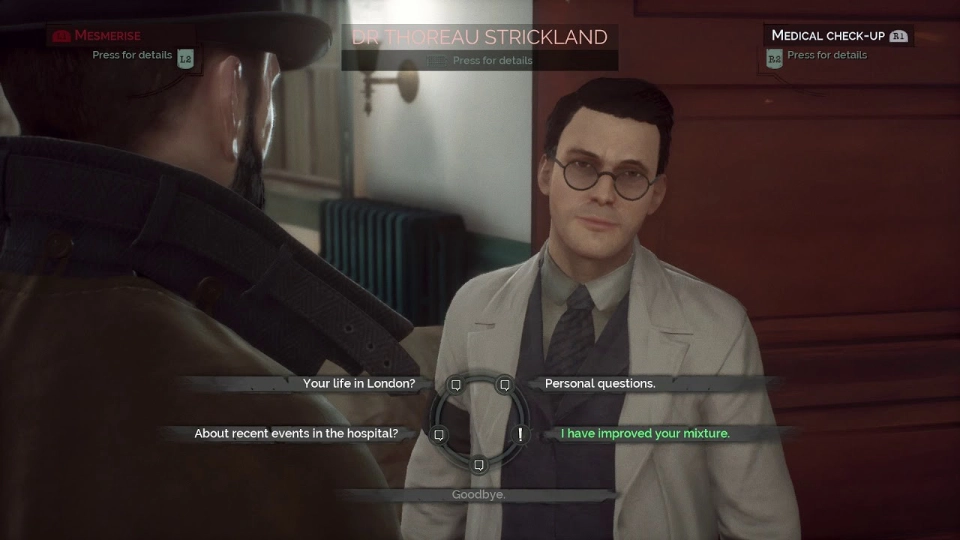
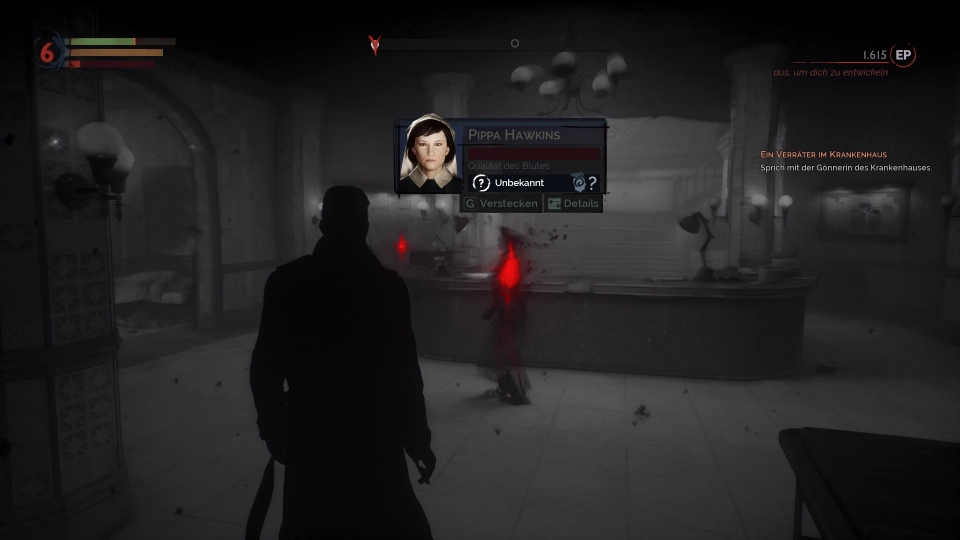
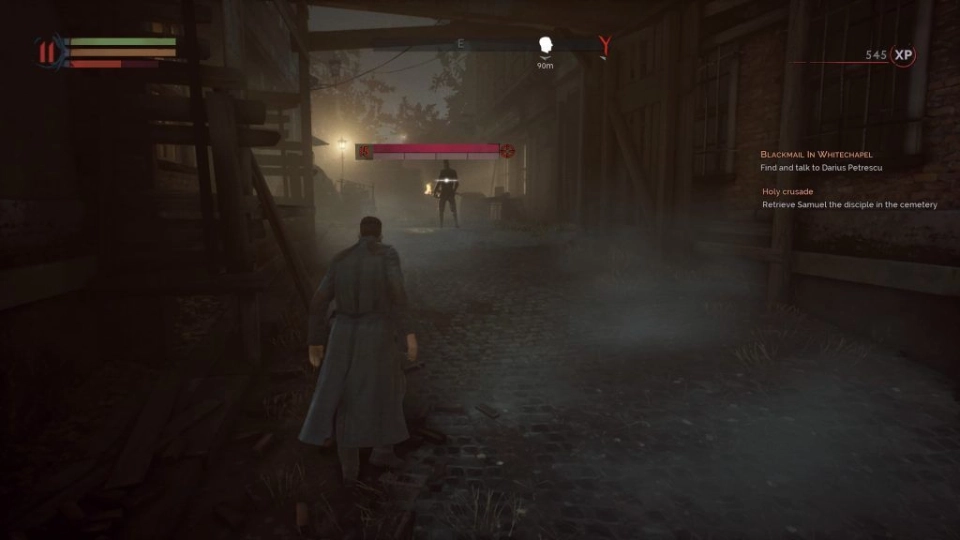
The introduction to Vampyr builds up an immense pace and raises expectations of a AAA game - expectations that the game ultimately cannot fulfill. But first things first: After the opening, we meet Dr. Edgar Swansea, who knows a thing or two about vampires and is also the head of what appears to be the only hospital in all of London. We are Dr. Jonathan Reid, a doctor, war veteran and expert in blood transfusions. Under the guise of the sanatorium, we take over the night shift and set off in search of both the person responsible for our situation and some fun in the game.
Stories written by death
As an undead, we possess the basic vampire skills: as a shadow form, we can change position at lightning speed, hypnotize our interlocutors and then suck their blood. In battles, we also have a few attacks such as claw strikes, blood spears and shadow tentacles. We use dashes to dodge attacks, which costs stamina. In addition to our standard attacks, we can also beat down our opponent's defenses. If this is broken, we can start sucking blood at the touch of a button, which replenishes our blood supply for the vampire abilities. Overall, the combat system is very Souls-like and seems designed for duels with single opponents.
Unfortunately, we always encounter groups of enemies on average, with the exception of the boss fights. Due to the sometimes unfavorable camera control and because our hero can only take a few hits, especially at the beginning of the game on the medium difficulty level, frustration can quickly set in. Conversely, the combat system lives by the motto: okay to learn, easy to master. This is also due to the fact that the enemies do not differ greatly from one another. We have the zombie-like “Skarls”, vampires and vampire hunters with different versions. Whether the enemy can teleport or spit poison, however, makes little difference to the underlying mechanics. The bottom line is that we alternate between hitting the opponent with a blade and vampire powers until the life bar is empty. Tactics? Absent. Although we can sneak up on some enemies and stun them with a surprise attack, this doesn't really give us an advantage. After the first few hours, the exciting battles quickly degenerate into an annoying repetition of attack patterns.
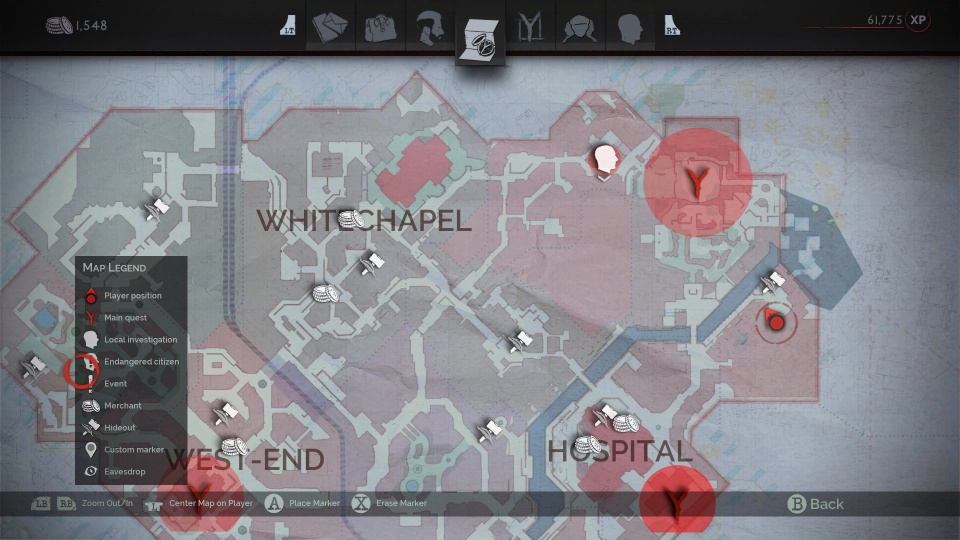
This is also due to the fact that there is not much variance in the skills. We can learn these in the classic way by gaining experience points, which we get for finishing off enemies, side quests and main missions. On the one hand, there aren't that many active skills that can be learned, namely two defensive skills, two mobility skills, three attacks, three ultimates and a heal. On the other hand, we have to upgrade these gradually so that they remain useful against the opponents who level up with us (I hate it!). The same also applies to the passive perks, which give us more life energy, increase our stamina or increase the number of portable syringes.
Patients ruining our patience
“Well,” you might think, ”that's like most role-playing games.” True, but unlike other role-playing games, Vampyr makes two mistakes: firstly, it is very stingy with experience points and secondly, it penalizes leveling up. To level up Dr. Reid, he has to go to sleep in a hideout. That wouldn't be a problem if the feature from hell didn't come into effect. More on that in a moment - a little patience. During our exploration of the British metropolis, we meet the nocturnal inhabitants of the four districts of Whitechapel, Pembroke Hospital, West End and the docks, who go about their usual lives on the streets despite the ongoing epidemic - naturally. But not at any time, but in the darkness of the night. Vampyr is set exclusively after midnight, and only at the beginning are we briefly immersed in a ray of sunlight. In this way, the game avoids the problem of the easily inflammable protagonist and at the same time limits the number of NPCs - a trick that makes sense in terms of gameplay, but also denies the whole thing an exciting narrative. How do I get from A to B during the day, how do I maintain my cover, etc.? Exciting aspects that are unfortunately omitted. But I don't want to grumble about that just yet, as including these features could just as easily become very annoying.
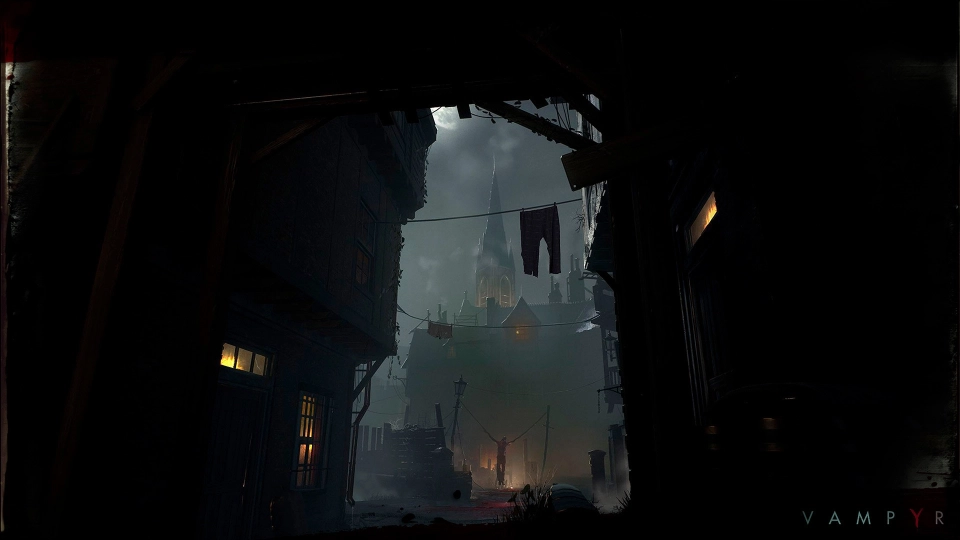
What is annoying, however, is that we as doctors can heal the inhabitants of London with self-made medicines. Narratively, this may make sense, but - and here comes a big but - the mechanics also ensure that the inhabitants fall ill by chance every night that passes. Worse still, any untreated illness can worsen, which is why we have to use stronger and therefore more difficult to produce drugs to treat it. There is also a health meter that indicates the health status of a district. If this even drops into the critical range, chaos breaks out, which means that all characters die and monsters take over the streets. As the game saves automatically to make the whole thing a quick-save-free and “immersive” experience, careless behavior can quickly give you a reason to restart the game. That's why we should always think twice about whether we should go to sleep for the purpose of skill distribution or whether we'd rather stay underleveled until it can no longer be avoided.
Well, you might think, why don't we just treat the diseases every time? Sure, you can - but who has the time? Because there is no fast travel system and the characters are not marked on the map. Although London is not particularly huge and walking the routes contributes to the worldbuilding, the streets are winding, sometimes blocked and filled with numerous enemies. If you want to provisionally treat all of the sick, you have to be prepared for a lot of running and fighting. In addition, the appropriate medication must first be crafted. We can loot the resources for this from enemies or containers, or buy them for a lot of money from the merchants. The result is a huge chain of actions we have to undertake for leveling up.
The Good and the ugly Bad
But now comes the good news: the whole thing can be avoided. If, unlike me, you don't want to be a “good” doctor, you can suck out the inhabitants one by one with a sufficient level. Better blood donors give you more experience and don't get sick any more - hooray! So those who play the evil game are rewarded twice over. We can also uncover clues about our future victims. The more we know about a person, the juicier the XP reward. In other words, if I know that my victim has a crush on his neighbor, I get even more experience. How does that work? Never mind. The result is a grotesque logic: if you don't want to kill anyone, you not only have more work, you are also weaker and don't really gain anything from getting to know the inhabitants better. Apart from a few additional dialogs and a handful of side quests, our investigations don't help us at all. Sure, we get to know the people and their background stories better, but doesn't everyone start the game with the goal of either sucking out all the people or no one, or is that just me?
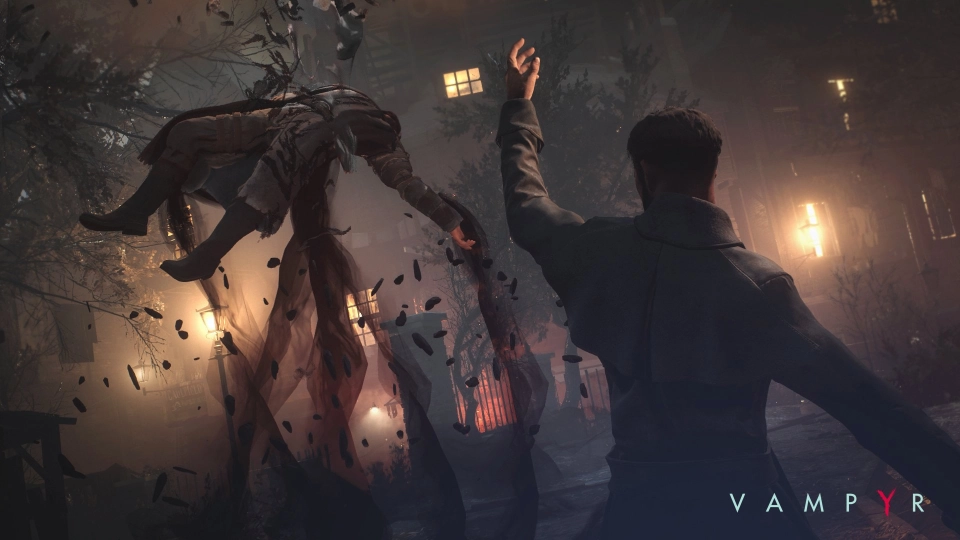
That's where the bat bites its leathery tail. If I don't want to kill anyone, I don't need to get to know people better - which is what I actually want, if only to justify why I should let them live. If, on the other hand, I want to suck everyone and everything dry, I have to uncover the clues to get the full XP load - but I still won't spare them with the newly gained knowledge. A contradiction that led me to simply skip the dialogs. What do I care about a person's story if I can't influence it? I can confront characters with clues I've found - what does it achieve though? Nothing. On the contrary: If I answer inappropriately, I can even lose the clue irretrievably. Fun looks rather different.
The vampire from Heroes of Might and Magic II
The fact that I skipped the unimportant dialog towards the end was not least due to the actual story. As fast-paced as it starts, it quickly turns out to be a pipe-dream, although the first few hours at the docks and especially in the hospital are still exciting at first. We are given insights into the - apart from the supernatural - seemingly realistic London at the beginning of the 20th century, have debates about blood transfusions and learn about the political unrest and war-related post-traumatic stress. But the hunt for the person responsible for our condition quickly devolves into a tiresome running from A to B , with cryptic clues, over-the-top characters and one of the worst romances I've had the pleasure of experiencing in video game cosmos for a long time.
Even apart from the romance, the characters' behavior is quite bonkers. Enemies want to get at us so that the monotony of the street brawls at least briefly gives way to staged duels, and more than once I thought: “Why? Why are you doing this now? And why like this? You could just... Never mind, you're just there to get hit anyway.” But the really sad thing is that these fights are hardly any more exciting than the rest.
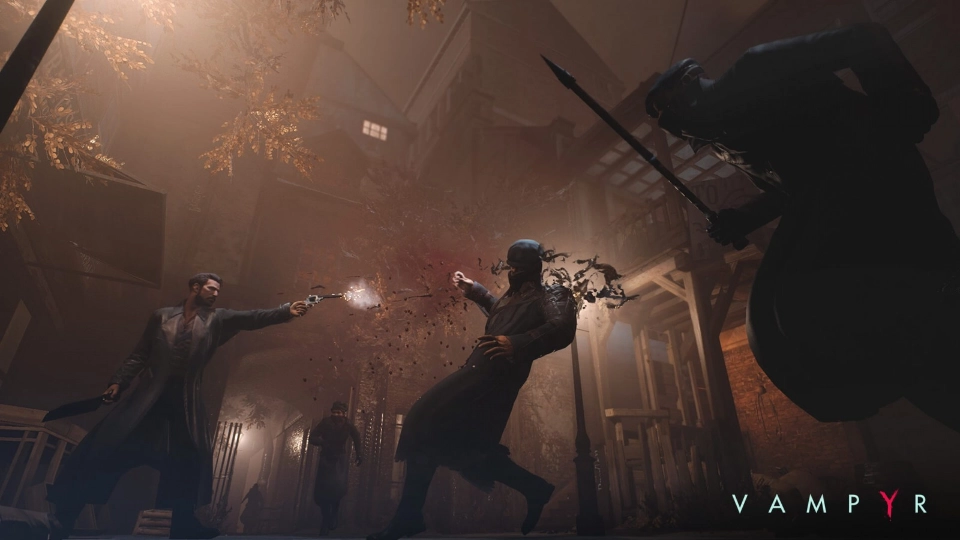
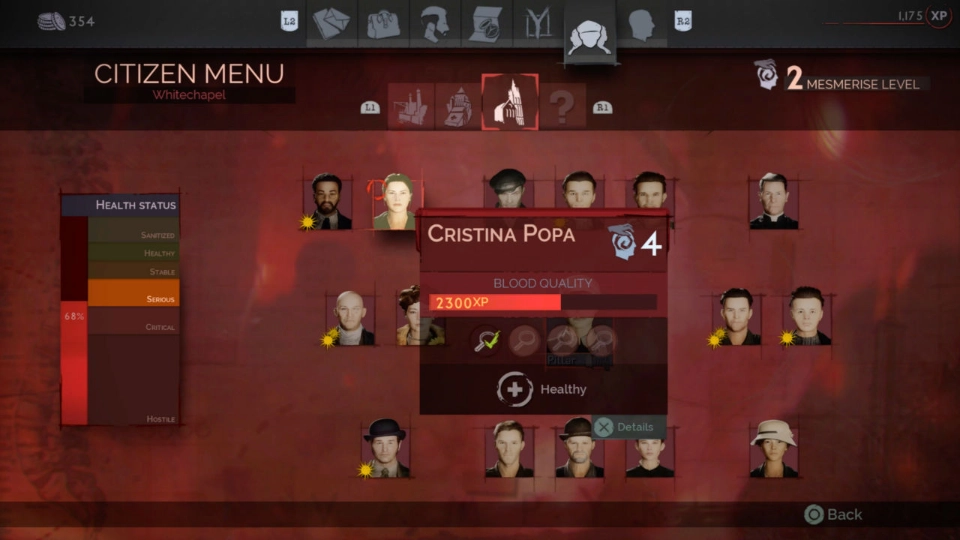
It sounds like the constant tapping of the hammer on the coffin nails that are slowly driving Vampyr into an irrecoverable grave. But are there any positive things to report? Yes, absolutely. London is atmospheric, the soundtrack is pleasantly eerie and, especially when we are overpowered, beating up enemies is great fun. You also have to give the game credit for the fact that it's not a blockbuster title of the Assassin’s Creed brand, but an attempt by Don't Nod to play in a new genre. Given that it is virtually new territory for the developers alongside Remember Me from 2013, it is only at second glance that you notice that Vampyr is at most an AA game.
The sum of its flaws
But even that doesn't excuse why some negative aspects are so obvious - especially as the game raises them itself. For example, right at the beginning of the story we are shown that our protagonist is weakened by Christian symbols. Later on, an enemy type will appear that slows us down in battle with a cross. Despite this, we walk past churches, attend a funeral and even go to a priest for confession. This feels inconsistent and not thought through to the end.
Our protagonist can also suck out rats he finds on the streets, but even after the 50th rodent he comments on this with the same line about how disgusting he finds himself or that his hunger would drive him to do this - why wasn't this removed or at least replaced after the second or third time? Speaking of hunger: As vampires, we have to listen to how difficult it is for us to control our thirst for blood throughout the story. In reality, however, only the scripted murder of our sister right at the beginning is unavoidable; in the actual game, nothing forces us to deal with our “thirst”. Mental training? Self-control? We don't need that. That would have been a possible starting point for rewarding players who don't like to take a bloody sip!
Just as anaemic as Dr. Reid, the actual world of Vampyr is frighteningly empty, despite its small size. Every now and then we can take a fork in the road to explore a side alley - only to turn back disappointed and return later with the corresponding side quest. Almost everything takes place outside, only rarely do we go indoors. Atmospheric visits to houses such as the morgue at the beginning of the game, which bring back eerie, beautiful memories of classics such as Thief remain rare exceptions. And then the game sends us back there several times, because pointless backtracking is always so much fun. Beyond that, we roam the linear paths and fight the enemies that spawn after us, including masses of vampire hunters. Thinking about it, there are vampire hunters in this world who fight against both the infected and us, yet the inhabitants only talk about the sick and walk the streets at night? You shouldn't really think about it too much.
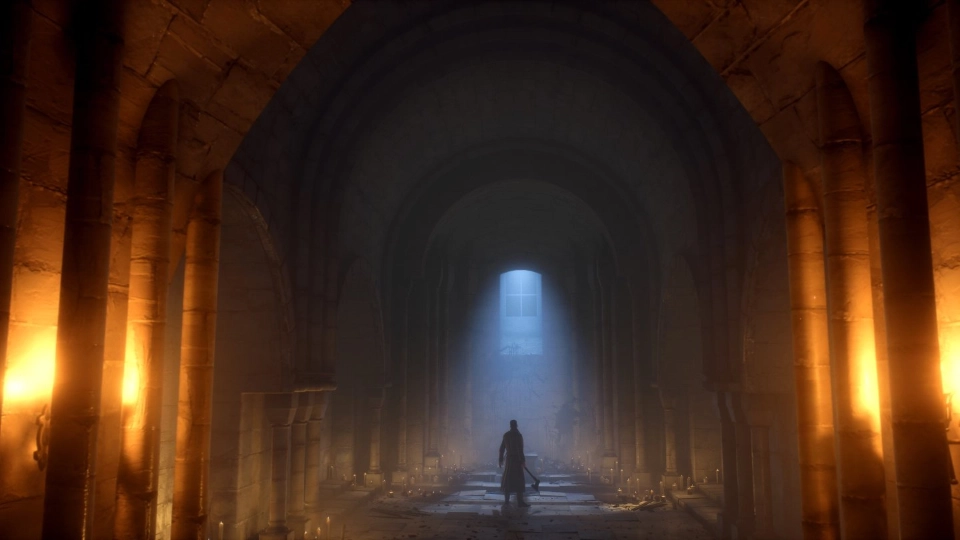
The graphics also do their bit to leave the game with mixed feelings: At times, the gloomy London shines through the chic lighting effects that reflect on puddles and wet streets or shows off the great particle effects of the guns and vampire abilities. Then again, you see awkward animations or cutscenes, such as one in which protagonist Jonathan laments the death of his sister in a sad voice: “Oh Mary, if I could change just one thing - anything, I would.” My thought was: “How about the facial expressions?” Wooden faces and expressionless eyes in a game that is supposed to live from its dialog - that simply shouldn't happen!
The vampire view, which provides us with information about our opponents and interlocutors and is reminiscent of the detective view from Rocksteady Studios' Batman-series, looks nice, but is ultimately more of a hindrance to exploration than really useful. Some skills also seem useless, which can be frustrating, especially during a good playthrough with limited experience points. Crafting is boring and uninspired, and upgrading weapons is more of a necessary evil. A small, final point of criticism, which was nevertheless a bit of an atmosphere killer for me, is the clumsy game design. Destructible objects are scattered all over the world and break as soon as we sprint through them. This may seem inappropriate in the case of a chair, but when entire gravestones shatter at a mere touch, all you can do is shake your head in annoyance.
Not the dark knight we need
That was pretty much my reaction after I finished the game. What had happened? Vampyr had had the audacity to present me with only the second best of the four possible endings. Why? I had dared to kill three people - three! All characters from the main story. And the best thing about it was that I couldn't prevent some of their deaths, or at least didn't want to. Does that make me an unscrupulous murderer? Apparently yes! Even though I had spent the entire 23 hours of the game meticulously trying to keep everything and everyone alive. A maytyrium (pardon my humor) that wasn't even rewarded in the end. Is it important to me to have seen the perfect ending? No. But does the game leave me with a good feeling now? Nope. But it wouldn't have either if I had gotten the finale that I spent a whole day playing for. Too many bugs almost made me abandon the game again and again. Even if Vampyr can't be called a bad game, it's just not a really good one either.
For anyone who can understand my disappointment, I would like to make it clear: I am not an angry child that didn't get exactly what it wanted. But Vampyr advertises itself as a game where choices have consequences. My decision not to kill anyone only made the game experience significantly worse. Dishonored presents me with the same choice, but it just makes the game harder. It doesn't actively punish me by giving me repetitive tasks and limiting my character development. You probably have to head to London with dampened expectations; you shouldn't expect a deep vampire role-playing game with a Life Is Strange-level story, but rather a middling action RPG that tries a lot of things but unfortunately doesn't get everything right. It may well serve as a break filler for in-between games due to the lack of alternatives in this vein that I know of, but not having played it is no real loss.
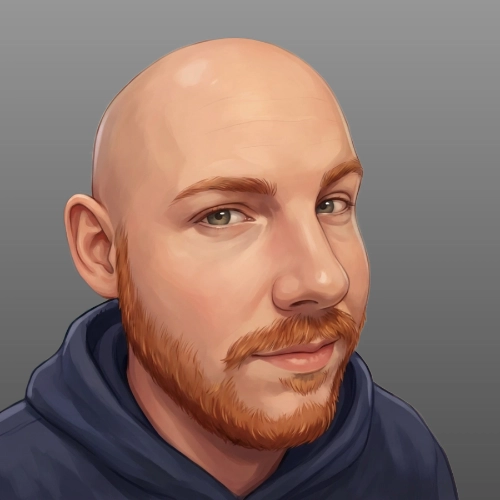
Bottom line
Vampyr is a game that fails because of its own ambitions. The premise of a doctor who must choose between healing and bloodlust is strong, atmospherically introduced, and narratively highly interesting—but it is consistently undermined by the gameplay. A repetitive, tactically shallow combat system, questionable progression mechanics, and a moral decision-making system that actively punishes “good” play increasingly undermine the title. Added to this are a surprisingly weak story development, inconsistent world-building, and technical and design flaws that are particularly painful in dialogues and staging. Vampyr is not a total failure and repeatedly shows flashes of potential, but precisely because it promises so much, its failure is all the more significant.
